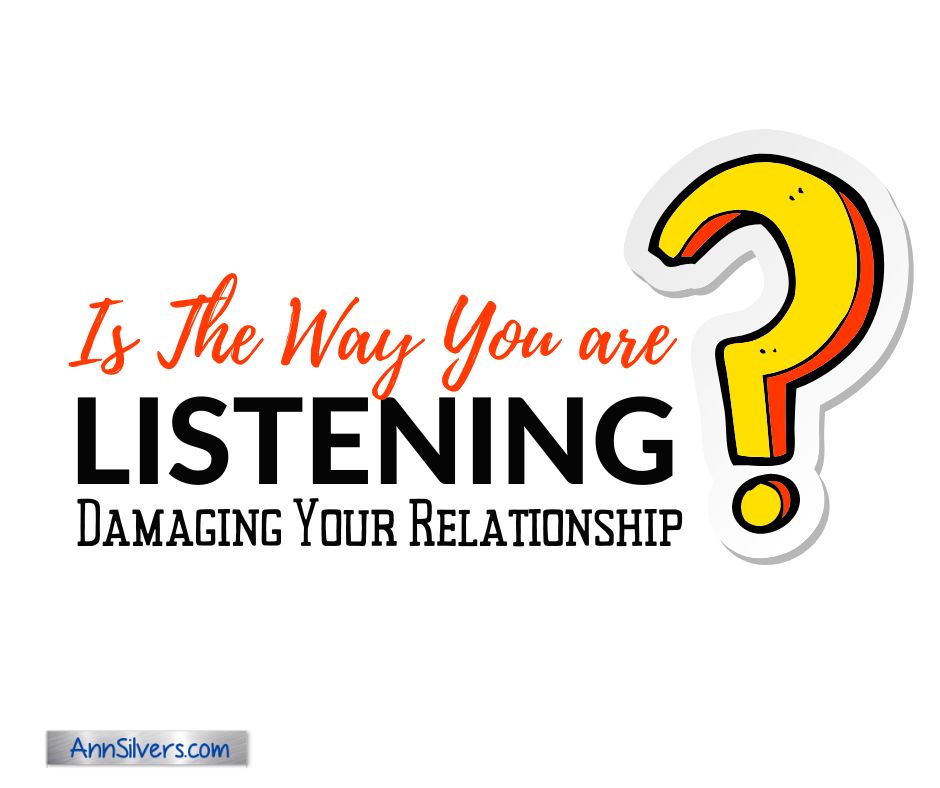Is The Way You are Listening Damaging Your Relationship?

Are you confused by your partner's complaints that they don't feel heard, even though you know you're listening to them?
Are you and your partner going around in the same circles that either don't resolve anything or make things worse?
Do attempts to talk things through just lead to escalation and frustration?
How you are listening to each other might be part of the problem.
Listening in a way that works is a skill that most people don't have. Most people use what I call "Not Listening Skills" when their job in the moment is to be a listener. These communication missteps create misunderstandings and messy buildup in couples: accumulated hurt feelings and resentments. They also contribute to people talking at each other rather than hearing each other and considering what they have to say.
What You'll Learn In This Post
| Effective Listening is Key to Happy Relationships |
| The Goals of Listening |
| The "Not Listening Skills" |
| When It's OK to Use the Not Listening Skills |
| Help Learning How to be a Good Listener |
Effective Listening is Key to Happy Relationships
One of the things I've noticed in working with thousands of clients as individuals and couples is that there is a great drive to feel heard. When we don't feel heard, we'll say it again, we'll say it again while crying or putting our fist through the wall, or we'll give up and conclude that the other person isn't capable of hearing us. All of that damages relationships.
The bad news is that poor listening skills damage relationships. The good news is that learning and using effective listening skills can often (though not always) turn relationships around quickly and clean up a lot of that old messy buildup.
Learning to be a good listener can also make you a dating superstar and much-appreciated partner.

The Goals of Listening
The goals of listening are threefold. You want to help the other person, help yourself, and help the team.
Effective listening:
1. Helps the other person
-
Feel heard (which increases their sense of safety in expressing themself)
-
Process their stuff (move from their presenting idea or problem to fuller idea, real problem, and their own solutions)
2. Helps you
- Understand the other person better
3. Helps both of you
- Feel closer, more like a team
The "Not Listening Skills"
Most of what we do when we are listening to others is counterproductive. Rather than advance understanding of what the speaker has going on, and help them express themself and feel heard, we either have a neutral or negative impact.
What most people do when they think they are listening includes:
-
Plotting rebuttal
-
Protecting
-
Questioning
-
Giving solutions
-
Criticizing
-
Reassuring
-
Diverting
-
Humoring
-
Withdrawing
-
Eye Rolling or using other body language that sends the message that the speaker is bad, sick, stupid, or crazy
People using any of the 10 Not Listening Skills often think they are doing a great job as a listener and don't see or understand that it's damaging their relationship. They may be listening to their partner, but their partner doesn't feel heard, and they don't really get what their partner is trying to tell them.
When It's OK to Use the Not Listening Skills
I’m not saying you can never use any of these actions — just don’t use them when your job in the moment is to be a listener. There is a time for most of the Not Listening Skills. Often, that time might be after you use actual listening skills that work.
After the speaker feels heard and you understand what they have going on, you might check in with them on whether they would like to hear some suggestions you have as possible solutions. It might be a good time to lighten the situation with humor or reassure the speaker. Even criticism might be appropriate — delivered with tact. But listen first.
Help Learning How to be a Good Listener
I explain what each of the Not Listening Skills looks like, and then teach you what to do instead, in my easy-to-read and quick-to-put-into-action booklet:
- A Quick Look at Listening That Works: simple, powerful tips to help you become a good listener, communicate more effectively, and improve your relationships.
It's available in print and downloadable full-color PDF on the website you are currently on. Click here to learn more.

- Ann Silvers






Comments 0